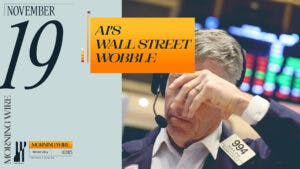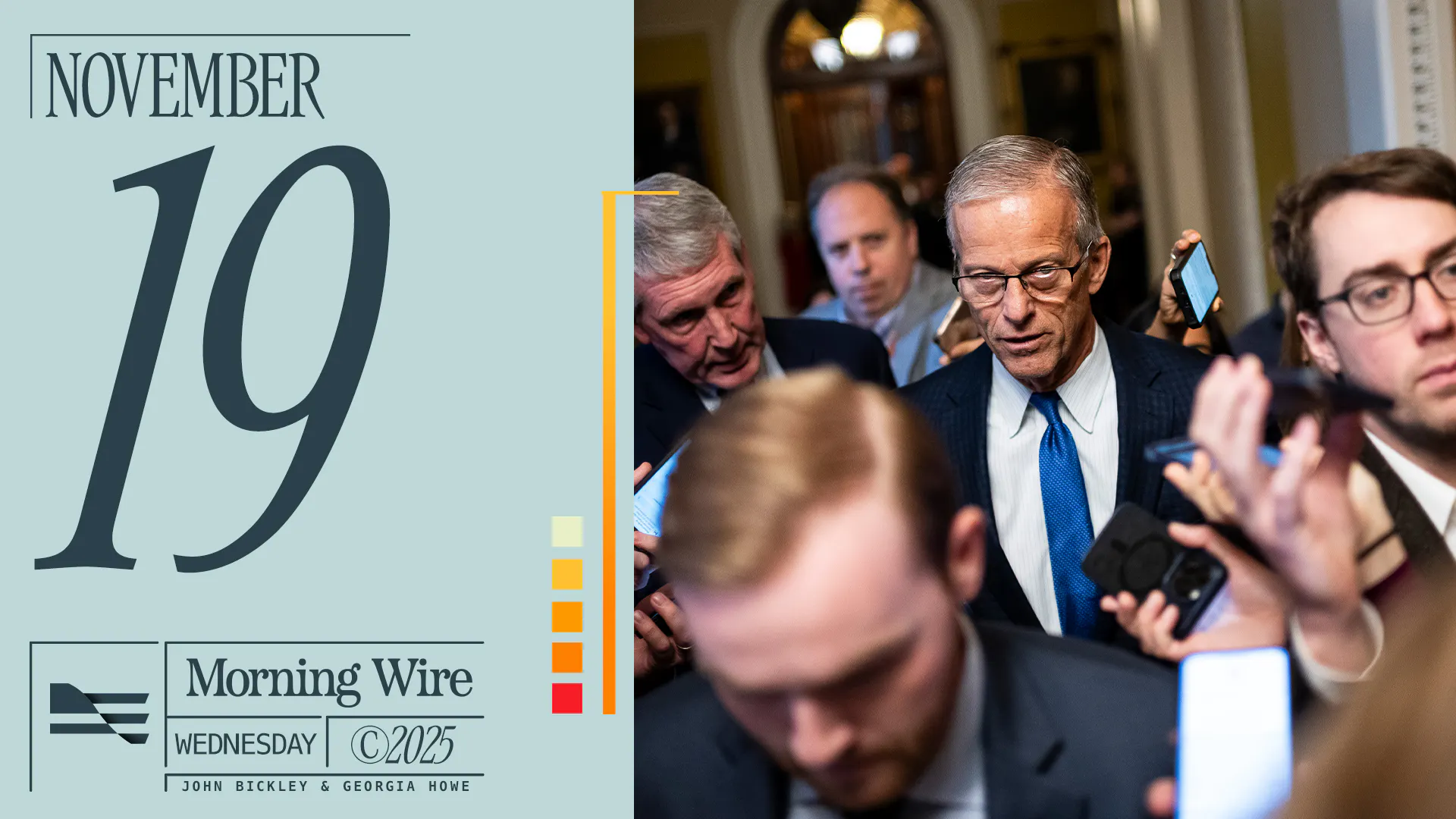Congress overwhelmingly votes to force the DOJ to open its full records on Jeffrey Epstein, markets tumble this week amid concerns about an AI bubble, and a new investigation suggests academic fraud in higher education.
It’s Wednesday, November 19, 2025, and this is the news you need to know to start your day. Today’s edition of the Morning Wire podcast can be heard below, and the video version can be seen on The Daily Wire:
Congress Approves Release Of Epstein Files

Topline: Congress on Tuesday overwhelmingly voted to release all Justice Department files tied to the late convicted sex offender Jeffrey Epstein – and with President Donald Trump’s support.
The Senate passed the bill by unanimous consent, a procedural method of approving legislation without a formal roll call, hours after the House passed the Epstein Files Transparency Act by a vote of 427-1. It was sponsored by Rep. Thomas Massie (R-KY) and a host of Democrats, and effectively calls for the release of all of the so-called Epstein files. It specifically calls for the Justice Department to release materials that relate to Ghislaine Maxwell, Epstein’s escort and lover. The release will supposedly include details Americans have been waiting for a long time to learn.
Not so fast: There’s a good chance the Justice Department could retain some names, redact others, and restrict certain files it believes the public shouldn’t see.
This is standard practice for sensitive official releases. Democrats recently released files while redacting the name of the late Virginia Giuffre, one of Epstein’s victims. In Giuffre’s case, her identity and story regarding Epstein are already well-known, yet Democrats chose to redact her name anyway. There are certainly many discussions about how these documents will be viewed and what details the public will or won’t have access to.
White House under pressure: White House Press Secretary Karoline Leavitt has appeared very restrained, very careful, telling the public that Democrats are pushing for the release of these files to weaponize them against Trump. The administration’s messaging has been that Trump hated Epstein, that Trump kicked Epstein out of Mar-a-Lago, and that Trump was no longer friends with Epstein because he was a creep. The White House says Democrats want to weaponize these files and that if there were anything against Trump in them, it would’ve been used under the Biden Justice Department.
The pivot for the White House has been that Trump is realizing his original MAGA base wants the files. The president has also realized that both House and Senate Republicans support releasing the files.
Trump has already seen many different items released in the files, where people have tried to say this or that is incriminating to him. None of it has implicated the president in wrongdoing, however. Some items emerging might be distasteful or upsetting to some, but at the end of the day, none of it has implicated the president in anything like what Democrats would like to implicate him in.
Wall Street Bubble?

Topline: Global stock markets tumbled this week amid growing fears over an artificial intelligence (AI) bubble and ongoing affordability concerns.
Throughout the summer and fall, millions of Americans were ecstatic to open up their investment portfolio each week as markets soared. The DOW, S&P 500, and NASDAQ are up by more than 10% this year.
Those gains were primarily driven by excitement over AI, one of the most significant developments for Wall Street. As new applications and technologies emerge month after month, investors have gobbled up shares of anything remotely related to AI.
But in the past week, markets have begun to look a bit shaky—the DOW, SP500, and NASDAQ are each down by more than 3.5%, and tech stocks in particular have been hit the hardest.
Why? The biggest and most obvious concern is that a bubble has formed, and all the frenzied investors looking to get in on the AI action have pumped trillions of dollars into the industry, driving stock prices far beyond their worth.
Most AI companies are still in the research and development phase and are not making money. For example, MIT recently surveyed 300 AI companies and found that 95% had yet to turn a profit, despite taking in a combined $40 billion in outside investments.
Bets against AI: A number of well-known investors and venture capitalists are betting against AI stocks. Michael Burry, made famous in the movie “The Big Short” (2015), has reportedly made more than $1 billion in bets that Palantir and Nvidia’s stock prices will fall. Billionaire tech founder Peter Thiel and SoftBank CEO Masayoshi Son each liquidated all of their Nvidia stocks, sparking even more concern.
The other side: Goldman Sachs released a report this week expressing confidence that the market is correctly valuing the benefits from AI and that valuations are not at “bubble levels.” Two of their lead analysts wrote that “simple arithmetic” shows that markets are running “well ahead of the macro impact.” In other words, the market is pricing in future profits that will come thanks to AI technology.
Kenny Polcari, chief market strategist at Slatestone Wealth, told Morning Wire that the situation is not as bad as some people seem to think.
“While I think that valuations are stretched, I am not in the camp that I think we’re in a bubble. A bubble suggests something very different,” said Polcari. “This was the fourth industrial revolution. Everyone had to be in it, so they talked it up, and now with this, it’s exhausted. … It’s going to probably feel uncomfortable, but I’m not in the camp that I think it’s a bubble.”
Polcari conceded that prices were bound to correct at some point, but in his view, that presents a long-term opportunity for average investors.
Academic Standards Sink

Topline: Colleges are increasingly admitting students who struggle with middle school-level academics.
Pop quiz: 7 + 2 = blank + 6.
The answer is three, of course. A simple enough math problem, but a quarter of students at the University of California, San Diego didn’t know the answer to that question.
The school put out a report this month on a “steep decline in the academic preparation of its entering first-year students.” It said “[b]etween 2020 and 2025, the number of freshmen whose math placement exam results indicate they do not meet middle school standards grew nearly thirtyfold.” Worse, it wasn’t because they hadn’t taken courses in high school–they did, and many of them actually got high grades. The high schools seem to be just passing students who have no idea what they’re doing, often with As and Bs.
Consequences: If students aren’t ready for college-level work, they may face academic difficulties that increase their chances of dropping out and taking on debt without a degree.
The dumbing down of college has also led to inflation. Now, people have to waste precious years getting a graduate degree just to prove they’re as smart as what used to be required for a bachelor’s.
Why? Some, but not all, of what’s gone wrong has been driven by racial politics. A Daily Wire report published Monday on an HBCU (Historically Black College and University) underscores the concerns.
The University of Maryland Eastern Shore admits 90% of applicants and has a 17% graduation rate. There have been four separate lawsuits filed against it in the last few months, alleging, among other things, that the school has almost no standards and condones cheating to keep its graduation rate from falling.
One lecturer, Ciu Fang, said that most students failed her advanced computer science class—a result she saw as the inevitable outcome of turning students who barely made it through high school into college undergraduates.

.png)
.png)

